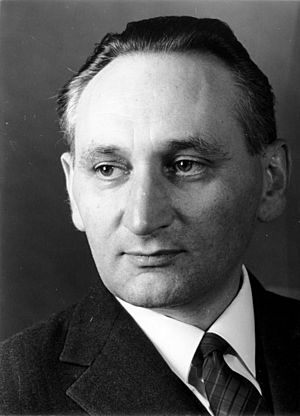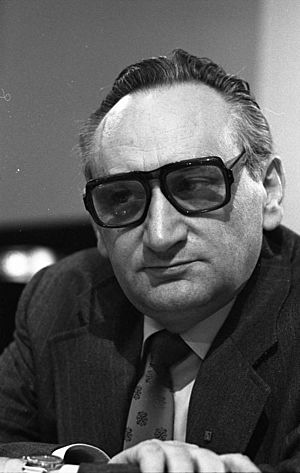Egon Bahr facts for kids
Quick facts for kids
Egon Bahr
|
|||||||||||||||||||||||||||||||
|---|---|---|---|---|---|---|---|---|---|---|---|---|---|---|---|---|---|---|---|---|---|---|---|---|---|---|---|---|---|---|---|

Bahr in 1969
|
|||||||||||||||||||||||||||||||
| Federal Manager of the Social Democratic Party |
|||||||||||||||||||||||||||||||
| In office 15 December 1976 – 23 February 1981 |
|||||||||||||||||||||||||||||||
| Leader | Willy Brandt | ||||||||||||||||||||||||||||||
| Preceded by | Holger Börner | ||||||||||||||||||||||||||||||
| Succeeded by | Peter Glotz | ||||||||||||||||||||||||||||||
| Minister for Economic Cooperation | |||||||||||||||||||||||||||||||
| In office 8 July 1974 – 14 December 1976 |
|||||||||||||||||||||||||||||||
| Chancellor | Helmut Schmidt | ||||||||||||||||||||||||||||||
| Preceded by | Erhard Eppler | ||||||||||||||||||||||||||||||
| Succeeded by | Marie Schlei | ||||||||||||||||||||||||||||||
| Minister for Special Affairs | |||||||||||||||||||||||||||||||
| In office 15 December 1972 – 16 May 1974 Serving with Werner Maihofer
|
|||||||||||||||||||||||||||||||
| Chancellor | Willy Brandt | ||||||||||||||||||||||||||||||
| Preceded by | Horst Ehmke | ||||||||||||||||||||||||||||||
| Succeeded by | Wolfgang Schäuble (1984) | ||||||||||||||||||||||||||||||
| State Secretary in the Chancellery Plenipotentiary of the Federal Republic of Germany in Berlin |
|||||||||||||||||||||||||||||||
| In office 1969–1972 |
|||||||||||||||||||||||||||||||
| Chancellor | Willy Brandt | ||||||||||||||||||||||||||||||
| Preceded by | Carl Krautwig | ||||||||||||||||||||||||||||||
| Succeeded by | Dietrich Spangenberg | ||||||||||||||||||||||||||||||
|
|||||||||||||||||||||||||||||||
| Personal details | |||||||||||||||||||||||||||||||
| Born |
Egon Karl-Heinz Bahr
18 March 1922 Treffurt, Province of Saxony, Free State of Prussia, Weimar Republic (now Thuringia, Germany) |
||||||||||||||||||||||||||||||
| Died | 19 August 2015 (aged 93) Berlin, Germany |
||||||||||||||||||||||||||||||
| Political party | Social Democratic Party (1956–2015) | ||||||||||||||||||||||||||||||
| Spouses |
Dorothea Grob
(m. 1945; died 2011)Adelheid Bonnemann-Böhner
(m. 2011) |
||||||||||||||||||||||||||||||
| Children | 3 | ||||||||||||||||||||||||||||||
| Occupation |
|
||||||||||||||||||||||||||||||
| Military service | |||||||||||||||||||||||||||||||
| Allegiance | |||||||||||||||||||||||||||||||
| Branch/service | |||||||||||||||||||||||||||||||
| Years of service | 1942–1944 | ||||||||||||||||||||||||||||||
| Rank | Fahnenjunker | ||||||||||||||||||||||||||||||
| Unit | Luftkriegsschule VI | ||||||||||||||||||||||||||||||
| Battles/wars | World War II | ||||||||||||||||||||||||||||||
Egon Karl-Heinz Bahr (born March 18, 1922 – died August 19, 2015) was an important German politician. He was a member of the SPD.
Bahr was a former journalist. He helped create Ostpolitik, a special policy promoted by West Germany. This policy aimed to improve relations with Eastern European countries, especially East Germany. He worked closely with West German Chancellor Willy Brandt.
From 1972 to 1990, Bahr was a member of the Bundestag, which is the German parliament. He also served as a minister in the German government from 1972 to 1976. Bahr played a key role in talks between West Germany and East Germany, and also with the Soviet Union. He was very important in negotiating several treaties. These included the Treaty of Moscow, the Treaty of Warsaw, the Transit Treaty of 1971, and the Basic Treaty of 1972.
Contents
Egon Bahr's Early Life and Career
Egon Bahr was born in Treffurt, Germany. His father was a high school teacher. After finishing school in 1940, Bahr studied to become an industrial specialist. This was at a company in Berlin called Rheinmetall-Borsig.
During World War II, Bahr served as a soldier from 1942 to 1944. He was a cadet in the air force. However, he was later removed from his military role. This happened because he was accused of not being "Aryan," due to his Jewish grandmother. After this, he worked as an armaments worker.
Becoming a Journalist and Diplomat
After the war, Bahr started working as a journalist. He wrote for several newspapers in West Berlin. From 1950 to 1960, he was a chief commentator for a radio station called RIAS in Bonn. In 1959, he became a press attaché at the West German Embassy in Ghana. This means he helped with public relations for the embassy.
Later in his career, from 1984 to 1994, Bahr directed an institute. This was the Institute for Peace Research and Security Policy at the University of Hamburg. He also became an honorary professor there. Egon Bahr was married and had three children. He passed away on August 19, 2015, at 93 years old.
Egon Bahr's Political Journey
Bahr joined the SPD in 1956 and remained a member until his death. From 1960 to 1966, he led the Press and Information Office for West Berlin. In this role, he was the spokesperson for the city's government. This government was led by Willy Brandt, who was the Mayor at the time.
From 1966 to 1969, Bahr worked as an ambassador. He was also a director in the planning staff of the German Foreign Office. Bahr was known as one of the most important advisors to Willy Brandt. He especially helped Brandt with his policy called Ostpolitik. This policy aimed to improve relations with Eastern Bloc countries. It was also known as Entspannungspolitik, which means "détente" or easing of tensions.
Key Role in German Treaties
After the 1969 West German federal election, Bahr became a Secretary of State. He worked in the German Chancellery. He also became a special representative for the German government in Berlin. In these roles, Bahr was a negotiator with Moscow. He helped create the 1970 Treaty of Moscow and the 1970 Treaty of Warsaw.
He also negotiated the Transit Treaty of 1971 and the Basic Treaty of 1972. These treaties were signed with the German Democratic Republic. Because of his success in these negotiations, Bahr is often called the "Architect of the Eastern Treaties." He also came up with two famous ideas for West Germany's relationship with East Germany. These were "Wandel durch Annäherung" ("change through rapprochement") and "Politik der kleinen Schritte" ("policy of small steps").
Bahr's work on Ostpolitik was often done in secret. However, some details of his talks in Moscow were leaked to a newspaper. This event became known as the "Bahr Paper."
After Brandt's Resignation
When Willy Brandt resigned as Chancellor, Bahr also left his government position. However, Brandt's successor, Helmut Schmidt, reappointed him. Bahr then served in the Ministry for Economic Cooperation and Development. He left the federal government permanently in December 1976.
Bahr was a member of the German Bundestag from 1972 to 1990. He was also the chairman of a special committee. This committee focused on disarmament and arms control. In 1980, Bahr joined a group called the Independent Commission for Disarmament and Security. This group suggested creating a nuclear-free corridor in Central Europe.
From 1976 to 1981, Bahr was the executive director of the SPD party. During this time, he was involved in a situation regarding a young politician. This politician had suggested that the German Communist Party could work with the SPD.
In 1988, Bahr said that talking about German reunification was "lies" and "political pollution." In November 1989, just before the Berlin Wall fell, he said, "For heaven’s sake, let’s stop dreaming and blathering about German unity." Five days after the Berlin Wall fell, he still called reunification a "delusion."
After the Cold War ended, Bahr wrote about Germany's future foreign policy. He believed that Europe and Germany should have more influence in the world. He called this being a "Civilian power." In 1991, he also suggested creating a German peace corps.
Selected Honors and Awards
Egon Bahr received many awards for his work.
- In 1973, he was given the Bundesverdienstkreuz (Federal Cross of Merit).
- He became an honorary citizen of Berlin in 2002.
- In 2007, he received the Willy Brandt Prize.
- In 2008, he was honored with the Göttingen Peace Prize and the Marion Dönhoff Preis.
- He also received an honorary doctorate in 2008 for his work in uniting Europe.
- In 2010, he received the Order of Merit of North Rhine-Westphalia.
Published Works
- Zu meiner Zeit (In My Time). This is Bahr's autobiography.
- Willy Brandts europäische Außenpolitik (Willy Brandt's European Foreign Policy).
- Deutsche Interessen: Streitschrift zu Macht, Sicherheit und Außenpolitik (German Interests: A Polemic on Power, Security, and Foreign Policy).
- Der deutsche Weg: Selbstverständlich und normal (The German Way: Obvious and Normal).
- "Plädoyer für eine transatlantische Arbeitsteilung" ("Plea for a Transatlantic Division of Labor").
- Ostwärts und nichts vergessen! Kooperation statt Konfrontation. (Eastward and Forget Nothing! Cooperation Instead of Confrontation.).
- „Das musst du erzählen“ – Erinnerungen an Willy Brandt. ("You Have to Tell That" – Memories of Willy Brandt.).
- Das Prinzip Apfelbaum: 11 Persönlichkeiten zur Frage „Was bleibt?“ (The Apple Tree Principle: 11 Personalities on the Question "What Remains?").
Literature
- Andreas Vogtmeier: Egon Bahr und die deutsche Frage. Zur Entwicklung der sozialdemokratischen Ost- und Deutschlandpolitik vom Kriegsende bis zur Vereinigung. (Egon Bahr and the German Question. On the Development of Social Democratic Eastern and German Policy from the End of the War to Reunification.)
- Daniel Friedrich Sturm: '"Metternich" in Moskau. Egon Bahrs Wandel durch Annäherung". (""Metternich" in Moscow. Egon Bahr's Change Through Rapprochement.")
See also
 In Spanish: Egon Bahr para niños
In Spanish: Egon Bahr para niños
 | Jessica Watkins |
 | Robert Henry Lawrence Jr. |
 | Mae Jemison |
 | Sian Proctor |
 | Guion Bluford |


